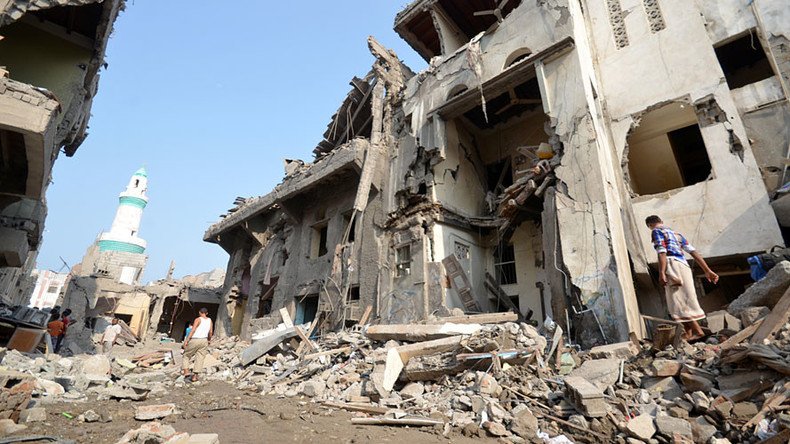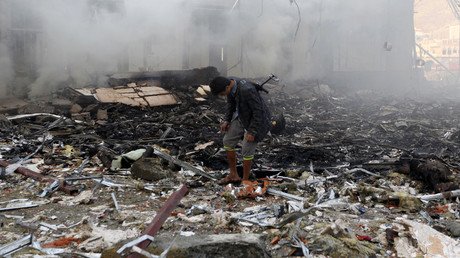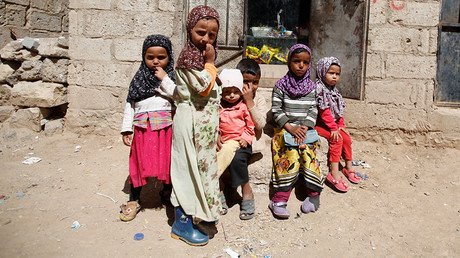Yemen ceasefire set to begin Wednesday for 72hrs – UN special envoy

A 72-hour ceasefire will begin in Yemen on Wednesday night, a UN envoy has announced. It comes amid an 18-month battle between Houthi rebels and the Yemeni government, which has led to the deaths of up to 10,000 people.
UN Special Envoy to Yemen Ismail Ould Cheikh Ahmed said in a Monday statement that all parties have agreed to the ceasefire, which will begin at 11:59pm local time (20:59 GMT) on Wednesday. It will last for a period of 72 hours and will be subject to renewal.
Yemeni Foreign Minister Abdel-Malek al-Mekhlafi also announced that President Abd Rabbu Mansour Hadi had “agreed to a 72-hour ceasefire to be extended if the other party adheres to it, activates the DCC [De-escalation and Coordination Committee] and lifts the siege of Taiz.”
The DCC is the United Nations-backed military commission responsible for overseeing ceasefires in Yemen.
In addition to a halt in “military activities of any kind,” the ceasefire will include an obligation to allow “free and unhindered access for humanitarian supplies and personnel to all parts of Yemen,” according to the UN statement.
Ould Cheikh Ahmed welcomed the ceasefire, stating that it will “spare the Yemeni people further bloodshed and will allow for the expanded delivery of humanitarian assistance.”
He called on all Yemeni parties, the region, and the international community to encourage full respect for the cessation of hostilities.
The Monday announcement came after the US and Britain urged a ceasefire in Yemen.
“This is the time to implement a ceasefire unconditionally and then move to the negotiating table,” US Secretary of State John Kerry said after meeting with British Foreign Secretary Boris Johnson on Sunday. “We cannot emphasize enough today the urgency of ending the violence in Yemen.”
Kerry went on to say that he, Johnson, and Ould Cheikh Ahmed were calling on the ceasefire to begin “as rapidly as possible, meaning Monday, Tuesday.”
The US secretary of state’s comments came after an airstrike by Saudi-led coalition jets killed over 140 people and injured hundreds.
Both Saudi Arabia and the Houthis responded to the strike, with Houthi leader Abdul-Malek al-Houthi condemning it in a televised address and saying it had been done with US weapons and with a “green light” from Washington.
Saudi Arabia called the attack “regrettable and painful.”
“The coalition confirms that its troops have clear instructions not to target populated area and to avoid civilians,” Riyadh said in a statement.
An investigative body set up by the coalition concluded that the strike took place following incorrect information that Houthi leaders were allegedly in the area.
Tensions escalated in Yemen after Shia President Saleh was deposed in 2012 and his Houthi supporters – aided by Iran – eventually seized the capital city Sanaa in 2014.
Houthi forces then advanced from Sanaa towards the south, seizing large parts of Yemen, and sending Hadi into exile.
In March 2015, the Saudi-led coalition responded with airstrikes in order to stop Houthi advances and reinstate Hadi back into power. By late summer of that year, the Saudi-led forces had launched a ground operation.
The Houthis and their allies hold most of Yemen's northern half, while forces loyal to Hadi share control of the rest of the country with local tribes.
Up to 10,000 people have so far been killed since the fighting began, including 3,800 civilians, according to UN estimates.














